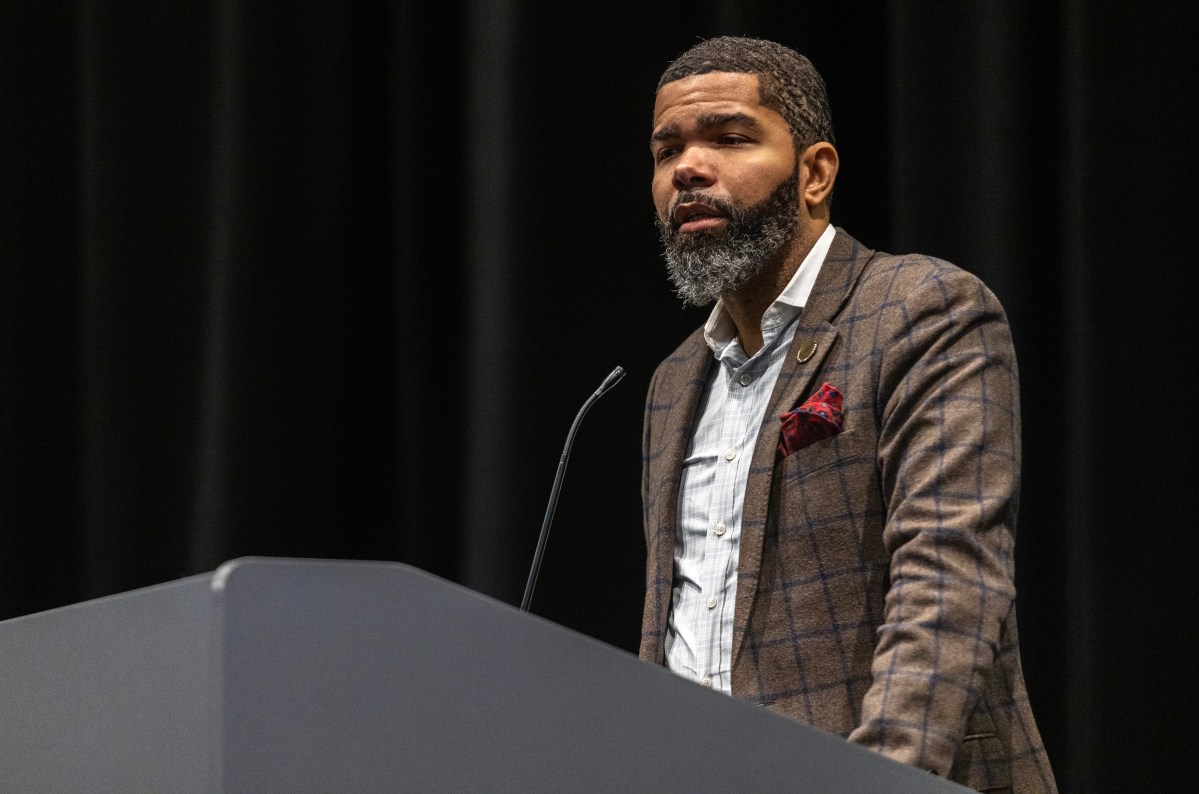Mississippi Today
Rebuilding trust: How Ted Henifin hopes to repair the relationship between Jacksonians and their water system
Rebuilding trust: How Ted Henifin hopes to repair the relationship between Jacksonians and their water system
Eager to spread the news of a massive federal investment in his city’s drinking water system, Jackson Mayor Chokwe Antar Lumumba called several town hall events over the last few months to update his constituents.
But to the residents in attendance, the $800 million coming to Jackson is far less tangible than the problems right in front of them, as many directed the same, commonly heard refrains towards Lumumba: What is with my water bill? Why am I being charged for water that’s unsafe to drink? Who’s going to fix the sewage spewing onto my lawn?
“I’m being charged for water I’m not even using,” one man said at a Forest Hill High School town hall in February, saying the water he was being charged for was leaking across his yard.
A woman in attendance said her monthly bill went from $55 to over $200, which she eventually just refused to pay. At another town hall in December, a resident said he got a bill in the thousands even though the water from his tap was brown.
Unable to speak to each person’s problem, Lumumba echoed a hopeful sentiment: While the city didn’t have the resources it needed before, it does now, and help is on the way.
While much has happened for the future of Jackson’s water since last fall – a federal takeover that placed a third-party team in control of the system’s improvement, the $800 million investment provided through several federal funding streams, a grant program that’s already eliminated $8 million in resident’s water bill debt in less than a week – the process of restoring trust among residents in what comes out of their taps is a long road ahead.
“I mean we’re going on, what, 40 years of distrust in Jackson’s water system?” said Brooke Floyd, a coordinator with the JXN People’s Assembly.
Floyd, a Jackson native, mother, and former teacher, said she distrusted the water even as a child, recalling her grandparents boiling the water for as long as she remembers.
“People are centering this on (the current) administration, but this is a deep-seated distrust that goes for years,” Floyd said. “So, I think it’s going to take some time for residents to understand, and it’s going to take some showing; you have to show people that the billing is going to get straightened out, and that our water is safe and that the pipes work, all those things.”
Last November, a federal judge appointed Ted Henifin to be the one in charge of lifting Jackson’s water system into a state of self-reliance.
Henifin recently sat down with Mississippi Today to talk about his game plan, as well as rebuilding trust in a water system among the people who have to pay for it.
Henifin said restoring credibility comes down to three changes: fixing the billing system, providing consistent water pressure by replacing small water lines and finally clarifying the existence of lead in Jackson’s distribution system.
Henifin’s plan
After working for 40 years in Virginia, it wasn’t until getting to Jackson that Henifin realized being a municipal utility worker could earn him public notoriety.
“People will recognize me pretty much everywhere I go, which is a little weird,” Henifin told Mississippi Today at his office. “I’ll be going out to dinner and people will say, ‘Oh, you’re the water guy.’”
But Henifin is in a city where such basic services – whether it’s garbage pickup, sewage disposal or drinking water – regularly leave residents without guarantees. He’s also in a position where few very, if any, municipal water professionals have ever sat.
In one of the largest federal interventions of a local utility system in American history, the U.S. government equipped Henifin with far-reaching authority that allows him to bypass local and state regulation, as well as nearly a billion dollars to spend on projects and a $400,000 personal salary.
His new title is chief executive officer of JXN Water, a nonprofit established to carry out the federal order put in place in November.
Although he’s heading a non-public entity that can avoid public record laws and government procurement rules, Henifin said he’s committed to transparency.

At the December town hall, Henifin waited afterwards to greet attendees, handing out his phone number to anyone who asked. While he said connecting with people directly is important for him to build credibility with Jackson residents, he admitted it’s been a little overwhelming at times trying to get back to everyone who reaches out.
But restoring trust is more than just being a personable face. Henifin said he wants residents, who will have to fund the water system once he’s left and the federal money has dried up, to feel that they’re paying into something worthwhile and that they’re being charged fairly.
“The billing system’s not helping us whatsoever at the moment, sending out terrible bills and continuing to struggle answering calls,” he said. “The trust-building where (residents) connect to us, which is really billing, is the big piece.”
While it’s a widely accepted practice for cities to charge customers based on how much water they consume, Jackson hasn’t had a reliable metering system in place for years due to the fallout from a failed Siemens contract, and residents are constantly burdened with inconsistent or incorrect bills.
As part of a debt relief program – funded through a new social safety net grant created under the CARES Act – Jackson last week began offering to correct water bills for customers who felt they were given incorrect charges. In less than a week, the city corrected $8 million in residents’ debt.
Recognizing the damage the broken water meters had done to the whole system’s credibility, Henifin in January laid out a novel approach in a financial proposal he was required to submit by the federal order: charging residents based on their property value. He conceded then that, as far as he knew, the only city to try something similar was Milwaukee with its wastewater system.
According to an analysis he presented, this system wouldn’t change much for the lower-income and average rate-payers: the median single-family household would see a $50 monthly bill; lower-value property owners would pay slightly less; and and higher-value owners would pay slightly more, with bills capped at $150.
What would change, Henifin explained, is that residents would be getting the same bill amount every month, taking away the monthly mystery that has haunted Jackson customers since the Siemens fiasco.
But on Wednesday, lawmakers passed a bill in the Senate that would ban charging customers for water in a way that doesn’t include consumption. The bill is headed back to a committee for further debate.
Henifin called out the Legislature’s efforts to interfere during a recent town hall at Millsaps college.
“There are so many things we pay for that aren’t directly connected to our use,” he. “We all pay for schools, not all of us have children. We all pay for trash, some people put out tons of trash, some people only put out a bit.
“We’re just stuck in this, ‘water has to be based on consumption’ mindset, but so many other things that are for society we pay for without even giving it much thought, because it’s all about a community that’s supporting the other members of the community.”
Lumumba has yet to comment on the idea, saying he hasn’t seen Henifin’s proposal.
The JXN Water CEO will spend the next few weeks and months at roundtables with community members to hear their thoughts on his idea, among others he put in his January financial plan.
Trusting the water
In 2015, test results for lead in Jackson’s water system showed samples above the “action level,” or legal limit, of 15 parts per billion (ppb). Just months later, the state Department of Health found that nearly a quarter of homes it tested had lead levels above 15 ppb.
The Environmental Protection Agency has since required the city to issue quarterly notices to residents, reminding pregnant women and children to take extra precautions before drinking the water. The EPA requirement is still in place for Jackson because the city has yet to complete a corrosion control plan to ensure no lead or copper dissolves into the water during the treatment process.
“How can you have trust if you have to have that statement on everything you put out about the water?” Henifin said.
He said the system to complete the corrosion control, which the city has put off completing for years, should be in place this summer, which would then allow the city to stop sending the quarterly notices.
But even after fixing the treatment process, the city will still have to ensure there’s no lead in the water lines of the distribution system. Henifin said he has a contractor set to do an inventory analysis of Jackson’s piping to determine if there are any lead service lines, and said that information should be presented to the public within a year.
Jackson is facing multiple lawsuits that allege the city exposed residents to lead, including one representing 600 children that alleges a coverup dating back to 2013.
Danyelle Holmes, National Social Justice Organizer with the Poor People’s Campaign, said that even with the city upgrading its water lines, there is still a concern of the presence of lead in the city’s homes, especially in poorer neighborhoods where pipe replacements are less feasible.
“If they’re old pipes they need to be replaced,” Holmes said. “We know that in south Jackson, and in west Jackson as well, a large portion of those homes are old homes, and those are the homes that we’re concerned will be disproportionately affected.”
In the city’s latest quarterly notice, it disclosed that during the July-December testing period it found the 90th percentile of results showed 6 ppb of lead; while 15 ppb is the legal limit, health experts say that no amount of lead is safe to consume.
Last year, a series of tests conducted by the Clarion Ledger and Mississippi Center for Investigative Reporting found positive results for lead throughout Jackson, with the highest being about 6 ppb at Jackson State University.
Restoring pressure: replacing lines, plugging leaks
Because of leaks throughout the distribution system, the city of Jackson loses about half of the water that it treats and puts out everyday. On average, water systems around the country lose about 15% of the water they put out.

Henifin’s team, led by former Jackson planning director Jordan Hillman, is finding major leaks throughout the city, he said, in some cases by detecting chlorine in puddles that wouldn’t otherwise be there. He projects that, through contracted work, they’ll be able to fix some of the larger leaks within the next two years.
The other issue, though, is the city’s small diameter water lines. The modern standard is that water lines should be at least 6 inches in diameter; Jackson, though, has over 100 miles of lines smaller than that.
Henifin projected it’ll take between five to 10 years to make the necessary fixes, with the goal of doing about 20 miles of replacements each year.
“Hopefully soon after we’ll get the anecdotal stories that people say, ‘Wow, the water’s great, it’s no longer discolored,’” Henifin said. “So, if we get a couple of those stories out by fall, I think by next year we could have some movement towards trust building if (we fix) the billing system, pipe replacement, and we get the corrosion control. Those three things should help to at least begin to build some trust.”
Optimistically speaking, Henifin added, if his team of contractors plug enough of the city’s leaks, Jackson could reach a point within the next year where it wouldn’t need the century-old J.H. Fewell, one of the system’s two treatment plants. City officials have for years hoped to retire Fewell, which would save Jackson “significant money” from not having to operate it, Henifin said.
What’s next
Pending the legislative session and feedback from upcoming community roundtables and city leaders, Henifin hopes to have the new billing system in place by October.
On Tuesday, Henifin also mentioned early talks of Jackson’s wastewater system, which is under an EPA consent decree, joining the drinking water system in the federal stipulated order. But he said that decision is at least a few weeks away.
Looking ahead, Henifin is already thinking about how he plans to leave the city. In his January proposal, he looked at the various options for long-term governance, and suggested the best option would be placing the water system under a corporate nonprofit, similar to JXN Water but with a board of governors made of local constituents.
Under that model, Jackson would retain ownership of the water system assets, and contract out its services. Henifin said while he hadn’t thoroughly researched it, he didn’t know of any water systems in the U.S. with a similar model.
He added that he didn’t think it’d be wise to give the city back full control of the system, citing local politics and obstacles in issuing contracts. He said he’s had that conversation with Jackson leadership, and thinks they may come around to the idea at some point.
“I don’t believe the city has demonstrated that they’re able to do this,” Henifin said. “With a track record like that, what would make any of us think that changes just because there’s an influx of federal dollars?”
On Wednesday, proposed legislation to create a state-controlled regional authority over Jackson’s water system died in the House.
Floyd, the coordinator with JXN People’s Assembly, said she’s encouraged by the work Henifin has done so far, and thinks he’s serious about winning over residents’ trust.
“There’s going to be a lack of trust with whoever is (running the water system),” Floyd said. “I don’t think people are really that worried with (Henifin) being from wherever and coming from the outside. When is the water going to be fixed and when is my bill going to be fixed? That’s the number one concern for everybody.”
In conversations with those affected by the ongoing water crisis, Henifin said he’s been surprised by the empathy he’s gotten from Jacksonians.
“The folks have very high expectations that I might be able to make a difference, but they also seem willing to be patient,” he said. “Much more so than if I was in their shoes and had lost water pressure for weeks during the summer and again at Christmas. I’ve found it actually to be increasing my personal pressure to succeed because so many people have been really nice about encouraging me.”
This article first appeared on Mississippi Today and is republished here under a Creative Commons license.
Mississippi Today
Trump nominates Baxter Kruger, Scott Leary for Mississippi U.S. attorney posts
President Donald Trump on Tuesday nominated Baxter Kruger to become Mississippi’s new U.S. attorney in the Southern District and Scott Leary to become U.S. attorney for the Northern District.
The two nominations will head to the U.S. Senate for consideration. If confirmed, the two will oversee federal criminal prosecutions and investigations in the state.
Kruger graduated from the Mississippi College School of Law in 2015 and was previously an assistant U.S. attorney for the Southern District. He is currently the director of the Mississippi Office of Homeland Security.
Sean Tindell, the Mississippi Department of Public Safety commissioner, oversees the state’s Homeland Security Office. He congratulated Kruger on social media and praised his leadership at the agency.
“Thank you for your outstanding leadership at the Mississippi Office of Homeland Security and for your dedicated service to our state,” Tindell wrote. “Your hard work and commitment have not gone unnoticed and this nomination is a testament to that!”
Leary graduated from the University of Mississippi School of Law, and he has been a federal prosecutor for most of his career.
He worked for the U.S. Attorney’s Office in the Western District of Tennessee in Memphis from 2002 to 2008. Afterward, he worked at the U.S. Attorney’s Office for the Northern District of Mississippi in Oxford, where he is currently employed.
Leary told Mississippi Today that he is honored to be nominated for the position, and he looks forward to the Senate confirmation process.
This article first appeared on Mississippi Today and is republished here under a Creative Commons Attribution-NoDerivatives 4.0 International License.
The post Trump nominates Baxter Kruger, Scott Leary for Mississippi U.S. attorney posts appeared first on mississippitoday.org
Note: The following A.I. based commentary is not part of the original article, reproduced above, but is offered in the hopes that it will promote greater media literacy and critical thinking, by making any potential bias more visible to the reader –Staff Editor.
Political Bias Rating: Centrist
This article presents a straightforward news report on President Donald Trump’s nominations of Baxter Kruger and Scott Leary for U.S. attorney positions in Mississippi. It focuses on factual details about their backgrounds, qualifications, and official responses without employing loaded language or framing that favors a particular ideological perspective. The tone is neutral, with quotes and descriptions that serve to inform rather than persuade. While it reports on a political appointment by a Republican president, the coverage remains balanced and refrains from editorializing, thus adhering to neutral, factual reporting.
Mississippi Today
Jackson’s performing arts venue Thalia Mara Hall is now open
After more than 10 months closed due to mold, asbestos and issues with the air conditioning system, Thalia Mara Hall has officially reopened.
Outgoing Mayor Chokwe A. Lumumba announced the reopening of Thalia Mara Hall during his final press conference held Monday on the arts venue’s steps.
“Today marks what we view as a full circle moment, rejoicing in the iconic space where community has come together for decades in the city of Jackson,” Lumumba said. “Thalia Mara has always been more than a venue. It has been a gathering place for people in the city of Jackson. From its first class ballet performances to gospel concerts, Thalia Mara Hall has been the backdrop for our city’s rich cultural history.”
Thalia Mara Hall closed last August after mold was found in parts of the building. The issues compounded from there, with malfunctioning HVAC systems and asbestos remediation. On June 6, the Mississippi State Fire Marshal’s Office announced that Thalia Mara Hall had finally passed inspection.
“We’re not only excited to have overcome many of the challenges that led to it being shuttered for a period of time,” Lumumba said. “We are hopeful for the future of this auditorium, that it may be able to provide a more up-to-date experience for residents, inviting shows that people are able to see across the world, bringing them here to Jackson. So this is an investment in the future.”
In total, Emad Al-Turk, a city contracted engineer and owner of Al-Turk Planning, estimates that $5 million in city and state funds went into bringing Thalia Mara Hall up to code.
The venue still has work to be completed, including reinstalling the fire curtain. The beam in which the fire curtain will be anchored has asbestos in it, so it will have to be remediated. In addition, a second air-conditioning chiller needs to be installed to properly cool the building. Until it’s installed, which could take months, Thalia Mara Hall will be operating at a lower seating capacity of about 800.
“Primarily because of the heat,” Al-Turk said. “The air conditioning would not be sufficient to actually accommodate the 2,000 people at full capacity, but starting in the fall, that should not be a problem.”
Al-Turk said the calendar is open for the city to begin booking events, though none have been scheduled for July.
“We’re very proud,” he said. “This took a little bit longer than what we anticipated, but we had probably seven or eight different contractors we had to coordinate with and all of them did a superb job to get us where we are today.”
This article first appeared on Mississippi Today and is republished here under a Creative Commons Attribution-NoDerivatives 4.0 International License.
The post Jackson’s performing arts venue Thalia Mara Hall is now open appeared first on mississippitoday.org
Note: The following A.I. based commentary is not part of the original article, reproduced above, but is offered in the hopes that it will promote greater media literacy and critical thinking, by making any potential bias more visible to the reader –Staff Editor.
Political Bias Rating: Centrist
The article presents a straightforward report on the reopening of Thalia Mara Hall in Jackson, focusing on facts and statements from city officials without promoting any ideological viewpoint. The tone is neutral and positive, emphasizing the community and cultural significance of the venue while detailing the challenges overcome during renovations. The coverage centers on public investment and future prospects, without partisan framing or editorializing. While quotes from Mayor Lumumba and a city engineer highlight optimism and civic pride, the article maintains balanced, factual reporting rather than advancing a political agenda.
Mississippi Today
‘Hurdles waiting in the shadows’: Lumumba reflects on challenges and triumphs on final day as Jackson mayor
On his last day as mayor of Jackson, Chokwe Antar Lumumba recounted accomplishments, praised his executive team and said he has no plans to seek office again.
He spoke during a press conference outside of the city’s Thalia Mara Hall, which was recently cleared for reopening after nearly a year of remediation. The briefing, meant to give media members a peek inside the downtown theater, marked one of Lumumba’s final forays as mayor.
Longtime state Sen. John Horhn — who defeated Lumumba in the Democratic primary runoff — will be inaugurated as mayor Tuesday, but Lumumba won’t be present. Not for any contentious reason, the 42-year-old mayor noted, but because he returns to his private law practice Tuesday.
“I’ve got to work now, y’all,” Lumumba said. “I’ve got a job.”
Thalia Mara Hall’s presumptive comeback was a fitting end for Lumumba, who pledged to make Jackson the most radical city in America but instead spent much of his eight years in office parrying one emergency after another. The auditorium was built in 1968 and closed nearly 11 months ago after workers found mold caused by a faulty HVAC system – on top of broken elevators, fire safety concerns and vandalism.
“This job is a fast-pitched sport,” Lumumba said. “There’s an abundance of challenges that have to be addressed, and it seems like the moment that you’ve gotten over one hurdle, there’s another one that is waiting in the shadows.”
Outside the theater Monday, Lumumba reflected on the high points of his leadership instead of the many crises — some seemingly self-inflicted — he faced as mayor.
He presided over the city during the coronavirus pandemic and the rise in crime it brought, but also the one-two punch of the 2021 and 2022 water crises, exacerbated by the city’s mismanagement of its water plants, and the 18-day pause in trash pickup spurred by Lumumba’s contentious negotiations with the city council in 2023.
Then in 2024, Lumumba was indicted alongside other city and county officials in a sweeping federal corruption probe targeting the proposed development of a hotel across from the city’s convention center, a project that has remained stalled in a 20-year saga of failed bids and political consternation.
Slated for trial next year, Lumumba has repeatedly maintained his innocence.
The city’s youngest mayor also brought some victories to Jackson, particularly in his first year in office. In 2017, he ended a furlough of city employees and worked with then-Gov. Phil Bryant to avoid a state takeover of Jackson Public Schools. In 2019, the city successfully sued German engineering firm Siemens and its local contractors for $89 million over botched work installing the city’s water-sewer billing infrastructure.
“I think that that was a pivotal moment to say that this city is going to hold people responsible for the work that they do,” Lumumba said.
Lumumba had more time than any other mayor to usher in the 1% sales tax, which residents approved in 2014 to fund infrastructure improvements.
“We paved 144 streets,” he said. “There are residents that still are waiting on their roads to be repaved. And you don’t really feel it until it’s your street that gets repaved, but that is a significant undertaking.”
And under his administration, crime has fallen dramatically recently, with homicides cut by a third and shootings cut in half in the last year.
Lumumba was first elected in 2017 after defeating Tony Yarber, a business-friendly mayor who faced his own scandals as mayor. A criminal justice attorney, Lumumba said he never planned to seek office until the stunning death of his father, Chokwe Lumumba Sr., eight months into his first term as mayor in 2014.
“I can say without reservation, and unequivocally, we remember where we started. We are in a much better position than we started,” Lumumba said.
Lumumba said he has sat down with Horhn in recent months, answered questions “as extensively as I could,” and promised to remain reachable to the new mayor.
This article first appeared on Mississippi Today and is republished here under a Creative Commons Attribution-NoDerivatives 4.0 International License.
The post 'Hurdles waiting in the shadows': Lumumba reflects on challenges and triumphs on final day as Jackson mayor appeared first on mississippitoday.org
Note: The following A.I. based commentary is not part of the original article, reproduced above, but is offered in the hopes that it will promote greater media literacy and critical thinking, by making any potential bias more visible to the reader –Staff Editor.
Political Bias Rating: Center-Left
The article reports on outgoing Jackson Mayor Chokwe Antar Lumumba’s reflections without overt editorializing but subtly frames his tenure within progressive contexts, emphasizing his self-described goal to make Jackson “the most radical city in America.” The piece highlights his accomplishments alongside challenges, including public crises and a federal indictment, maintaining a factual tone yet noting contentious moments like labor disputes and governance issues. While it avoids partisan rhetoric, the focus on social justice efforts, infrastructure investment, and crime reduction, as well as positive framing of Lumumba’s achievements, aligns with a center-left perspective that values progressive governance and accountability.
-
News from the South - Georgia News Feed6 days ago
Are you addicted to ‘fridge cigarettes’? Here’s what the Gen Z term means
-
News from the South - Oklahoma News Feed7 days ago
RFK Jr. Brings MAHA to Oklahoma
-
Local News7 days ago
St. Martin trio becomes the first females in Mississippi to sign Flag Football Scholarships
-
News from the South - South Carolina News Feed6 days ago
Federal investigation launched into Minnesota after transgender athlete leads team to championship
-
The Center Square5 days ago
U.S. Senate prepares for passage of One Big Beautiful Bill Act | National
-
News from the South - Tennessee News Feed5 days ago
Democratic resolution to block military action in Iran fails to advance in US Senate
-
News from the South - Virginia News Feed7 days ago
‘Hallowed ground, desecrated’: ICE sweeps at Chesterfield court draw fierce backlash
-
News from the South - Florida News Feed6 days ago
US Supreme Court allows SC to remove Planned Parenthood from list of Medicaid providers
















































